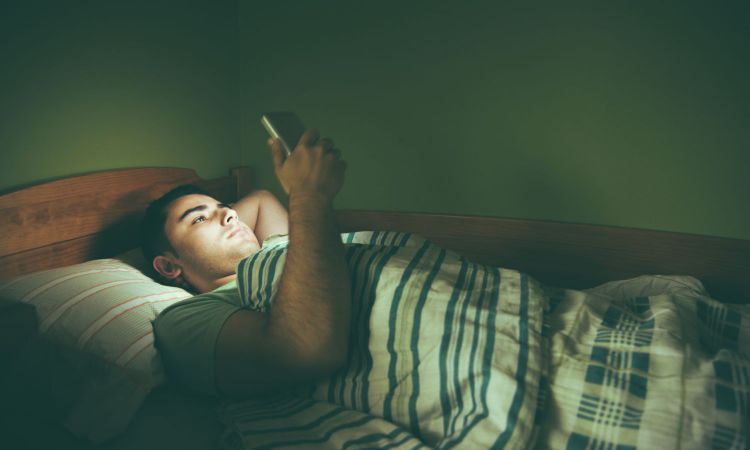 Many people take their smartphones with them everywhere they go and struggle to set limits on when and how often they use them. While staring at a digital device for hours a day has many negative effects on the brain and body, one of the most well-documented is the impact of smartphone use on sleep.
Many people take their smartphones with them everywhere they go and struggle to set limits on when and how often they use them. While staring at a digital device for hours a day has many negative effects on the brain and body, one of the most well-documented is the impact of smartphone use on sleep.
Smartphones and Blue Light
Smartphones, laptops, televisions, and tablets all have one thing in common: They all emit blue light. Blue light wavelengths make up one-third of visible light and release the highest energy.
Generally, blue light is not bad for health. In fact, the sun is a source of blue light, which can boost energy levels and mood. However, overexposure can cause eye strain, damage retinal cells, speed up macular degeneration, and contribute to cataracts.
Nighttime Exposure to Blue Light
Minimal exposure to blue light during the day is unlikely to impact sleep. However, researchers who study smartphones and health explore how screen use at night disrupts the circadian rhythm.
Before the invention of artificial light, humans would only be exposed to blue light during the day and would rely primarily on fire to see at night. This cycle would reinforce the body’s natural biological clock and reinforce sleep at night. When people use their smartphones at night, they disrupt this natural rhythm and suppress melatonin secretion.
Children and Blue Light
Recent research suggests that children are more vulnerable to blue light. Children’s eyes have less protection against blue light. A child’s lenses are very clear and become more yellow as they mature. This yellow tint typically develops by the age of 12 and provides some natural protection. When children are exposed to too much blue light or use screens at night, they are more likely to struggle with sleep and experience adverse health effects.
Smartphone and Overstimulation
While people might use their smartphones or watch television to relax at night, screens actually have the opposite effect. Using smartphones arouses the brain and causes overstimulation, especially in the occipital and temporal lobes.
Humans are sensitive to overstimulation from the time of infancy. Similar to how a baby might become overwhelmed and cry when playing with a loud or fast-moving toy, older children and adults often become irritated and restless from excessive screen time.
Digital devices release dopamine and increase stress, and they decrease performance in areas of the brain related to problem-solving, spatial awareness, memory, language, speech, coordination, heart rate, digestion, and more.
Smartphone Habits for Better Sleep
Smartphones can contribute to insomnia, depression, anxiety, and a wide range of other issues that can disrupt sleep. There are several changes people with a smartphone can make to promote better rest at night:
-
Put away smartphones at least 30 minutes before bed:
The less exposure to blue light at night, the better. Adults and children should stop looking at their smartphones or digital devices at least 30 minutes to an hour before bedtime. Ideally, people should avoid looking at any bright light source for two to three hours before sleeping.
-
Pick up a more relaxing wind-down activity:
Instead of watching TV, scrolling through social media, or watching videos online, people can more effectively relax after a long day by stretching, reading a book, journaling, or trying another screen-free activity.
-
Keep smartphones in a drawer or a different room:
Many people place their phones on their nightstands when asleep. Notifications can disrupt deep sleep and lead to a habit of looking at screens in the middle of the night. People can lengthen sleep by placing smartphones out of reach.
-
Activate night filters and use blue light glasses:
It’s not always possible to avoid using a device or being exposed to blue light at night. Many devices have built-in software that allows users to filter out blue light at night. Additionally, blue light glasses may help support better sleep.
While humans have become increasingly tied to their digital devices, researchers have studied and documented the negative impacts of smartphones on overall health. Limiting usage, especially at night, is key to improving sleep quality.











